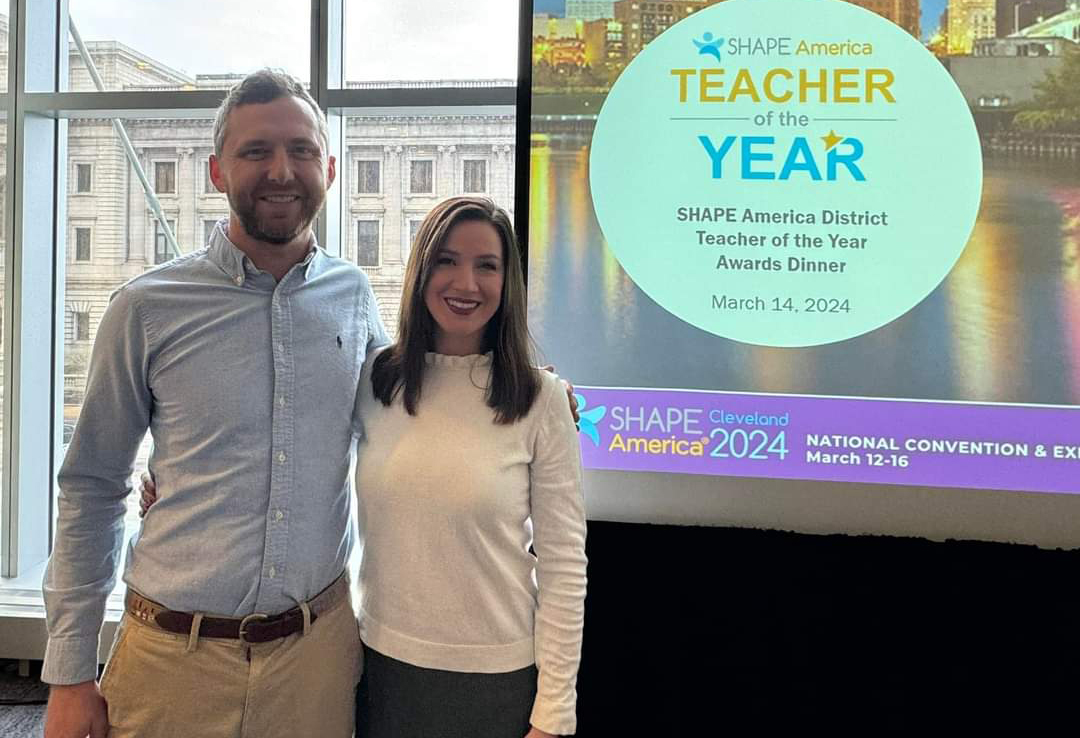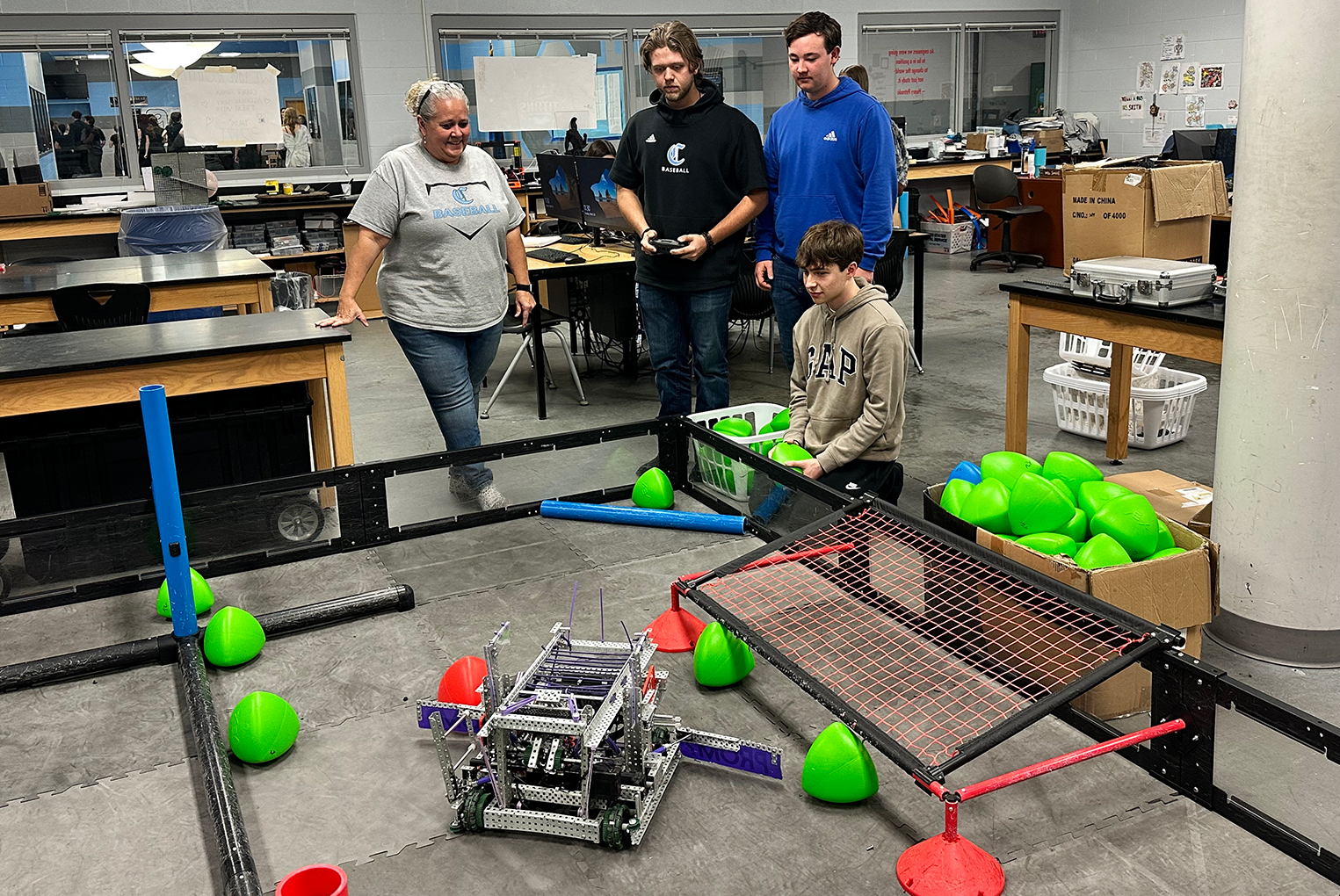
Alex Tumey and Kacie Clements research the Empire State building during Amanda Caudill’s class at Harrison County Middle School. Photo by Amy Wallot, April 5, 2011
By Matthew Tungate
Even as Kentucky teachers are implementing new national English/language arts and mathematics standards this year, two national groups are working to create new standards in social studies and science.
When, and if, those standards will be adopted for use in Kentucky schools still remains to be seen, but educators from the commonwealth are involved in their development.
The 2009 General Assembly mandated that Kentucky schools use new academic standards beginning with the 2011-12 school year. In February 2010, Kentucky became the first state in the country to adopt mathematics and English/language arts standards that were developed by a multi-state consortium. The new standards, though fewer in number, are supposed to allow deeper instruction at the classroom level.
Conceptual framework for science standards released
The National Academies released The Conceptual Framework for the Next Generation Science Education Standards to the public in July. This document is not a set of standards, according to Sean Elkins, science consultant with the Kentucky Department of Education. Rather, it is the basis from which the new science standards will be created.
The National Academies took the unprecedented step of releasing a draft of the Conceptual Framework document a year ago, Elkins said, with the idea that state-level science education experts like him would meet regionally to give feedback on the proposed document.
As a member of the Council of State Science Supervisors, Elkins attended some of those meetings, including one in Kentucky.
“Their purpose was that they wanted it to be transparent,” he said.
The now-finished framework has been handed over to Achieve, an independent, bipartisan, non-profit education reform organization. Achieve is developing “Next-Generation Science Standards” from the conceptual framework.
Achieve has hired experts to write the standards, including some who wrote the framework, Elkins said.
“These are the people who are at the forefront of science education,” he said.
Stephen Pruitt, vice president for Content, Research and Development at Achieve, has said there will be multiple opportunities to give feedback on drafts of the standards, Elkins said. Kentucky has applied to be one of Achieve’s lead states, meaning Elkins and other local educators will see the draft sooner and give input on implementation. An announcement is expected before the end of September.
A committee exists to give feedback on the standards. The committee includes Elkins, classroom teachers, representatives from each state university, members of organizations such as the Kentucky Science Teachers Association and Kentucky Education Association, and informal science educators, such as those at the Kentucky Department of Fish and Wildlife Resources.
“The main purpose of this group is to be prepared to give Kentucky’s feedback when it starts soliciting feedback from the states,” he said.
Elkins expects Achieve will release the new standards in the summer of 2012.
Elkins said the timetable is doable, as Achieve is not starting in a vacuum. He thinks the organization has the right people with the right backgrounds, plus there have been two documents already developed (the National Science Education Standards and Benchmarks for Science Literacy, which were the basis for Kentucky’s current standards).
Plus, the canon of scientific knowledge hasn’t changed, he said.
“The basic-level science has been known since Newton’s time and before, and I don’t think anyone is advocating for leaving that stuff out,” Elkins said. “There is sort of a basic body of knowledge that everyone agrees is fundamental in science.”
The 231-page Conceptual Framework for the Next Generation Science Education Standards does have some significant changes from Kentucky’s current science standards, Elkins said.
The framework contains a new element called science and engineering practices. It is a description of the way scientists and engineers approach their work, he said.
“It’s the ‘how’ of science as well as the ‘what’ of science, and that’s going to be a shift because our standards have been mostly about the ‘what’ and less about the ‘how,’” he said.
His hope is that the new standards will lead to teaching science from a conceptual perspective rather than just as facts.
Science isn’t just a collection of vocabulary and definitions, and any set of standards that grow from this framework, I imagine, will be about a really deep understanding of the science concepts rather than just sort of a surface knowledge about what the words mean,” Elkins said.
Earth/space, life and physical science are all equally laid out in framework, and engineering, technology and the application of science is added, he said.
The framework is built in three dimensions:
1. scientific and engineering practices
2. cross-cutting concepts
3. disciplinary core ideas
The aim is that every standard will cut across all three dimensions. The standards will integrate the dimensions as much as possible, Elkins said.
“If you’re a classroom teacher, and somebody hands you all this stuff as a list, and you start trying to plan your year thinking you’re somehow going to march through these things and teach them in isolation, you’ll run out of time,” he said. “But by incorporating them all together into standards that make sense, and teaching multiple concepts at once, it’s a much more efficient way to maximize student learning with standards that teach more than one thing at a time.”
Achieve is going to pay attention to the Common Core State Standards as the Next-Generation Science Standards are packaged and organized, Elkins said. Achieve also is looking at the standards to make sure mathematics and English/language arts correspond with science. For instance, scientific notation won’t be taught until students know exponential notation.
“So science teachers won’t have to stop to teach little points of math; they’ll be aligned that way,” he said.
New social studies standards developed very differently
The move for common social studies standards began in 2008 with a State Collaborative on Assessment and Student Standards (SCASS) called Social Studies Assessment Curriculum and Instruction composed of 20 states, including Kentucky, said Mendy Meehan, former social studies consultant for the Kentucky Department of Education. University of Kentucky associate professor Kathleen Swan is the director of the SCASS.
“We had to bring all the national organizations together to have one integrated set of standards that was viable for teachers, usable for teachers,” Meehan said.
One problem was that social studies is a very broad discipline with many sub-disciplines and groups – and each with its own set of standards, Meehan said.
So in January 2010, the National Council for the Social Studies (NCSS) and the Civic Mission of Schools (CMS) convened a meeting of national organizations in civics, economics, geography and history to discuss working together on common state standards for social studies. That meeting concluded with a common definition: “Social studies is an interdisciplinary exploration of the social sciences and humanities, including civics, history, economics, and geography in order to develop responsible, informed and engaged citizens and to foster civic, global, historical, geographic, and economic literacy.”
Over the past year, a coalition of 20 states and 15 professional organizations have met three times to begin exploring the development of Common State Standards in Social Studies, Swan said. The groups are in the process of developing guidelines for the standards. As the collaborative process continues, additional information and updates will be released, she said.
“Everyone at this table has had a passion for this work, and everyone wanted the goal to happen,” Meehan said. “We knew that we had to compromise, collaborate and cooperate for it to happen, and they have. There has surprisingly been very little controversy.”
Keep teaching Kentucky Core Content and Program of Studies
Elkins warned that schools should not begin revising their science curricula based on the proposed framework.
“I am certain that is not necessarily a wise move, because the translation from this as a framework to a specific set of standards, there’s room in there for interpretation and differences,” he said.
Even once the national science standards are released, Kentucky could choose to modify, add to or subtract from the standards. Unlike the English/language arts and mathematics standards, which states had to adopt as written and could only add 15 percent, “the science standards will be voluntary adoption,” Elkins said.
“Just because there is a set of common standards released doesn’t mean they will immediately become Kentucky’s standards without some input, modification, whatever,” he said. “And there’s going to be some lead time between the time the common standards come out and the Kentucky Board of Education makes some decision about what to do about those standards.”
Meehan said the same is true for social studies.
Teachers should still be using the Core Content for Assessment and Program of Studies.
“It’s very important that you stay with that for the next school year,” she said.
Science, social studies standards exists – sort of
Elkins reminded teachers that there are new standards in the two subjects.
“There are some new science and social studies standards. It’s just that they are cleverly concealed inside the English/language arts standards,” he said.
Science and social studies literacy standards exist within English/language arts standards, and science and social studies teachers are responsible for teaching those, not English/language arts teachers, he said.
“Reading text from a page and comprehending its meaning is still one of the very most basic of all skills,” Elkins said. “Literacy is everybody’s business.”
Meehan said the embedded standards are not content standards, though.
“They’re skills – speaking, reading, listening skills – that all teachers are doing in the classroom,” she said.
MORE INFO …
The Conceptual Framework for the Next Generation Science Education Standards
Sean Elkins, sean.elkins@education.ky.gov, (502) 564-2106, ext. 4128
Charles Hall, Charles.hall2@education.ky.gov, (502) 564-2106, ext. 4144



Leave A Comment